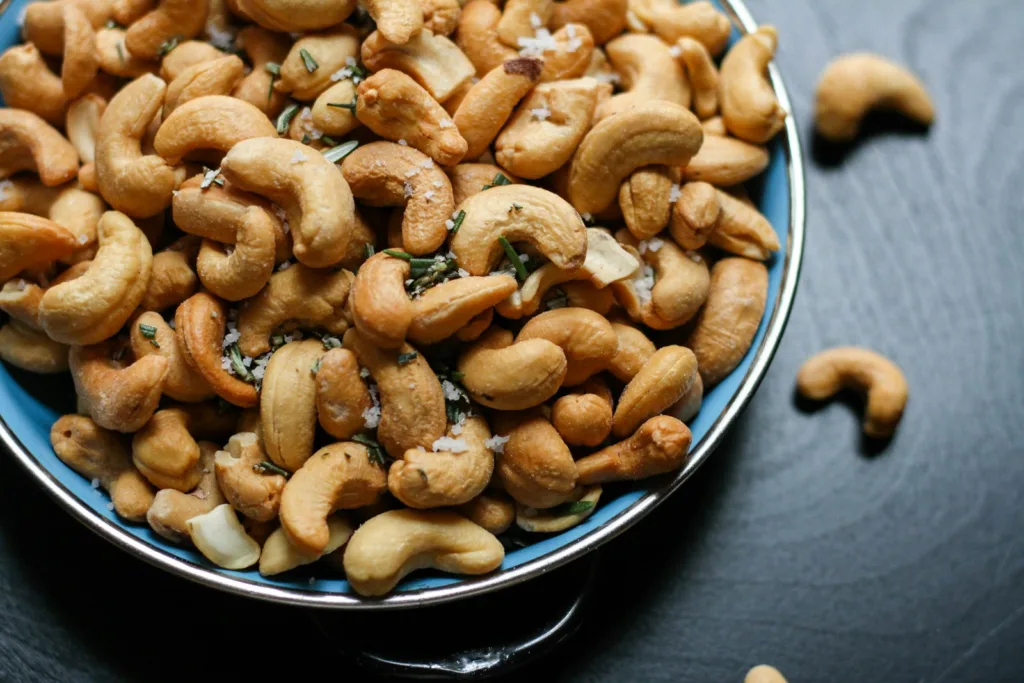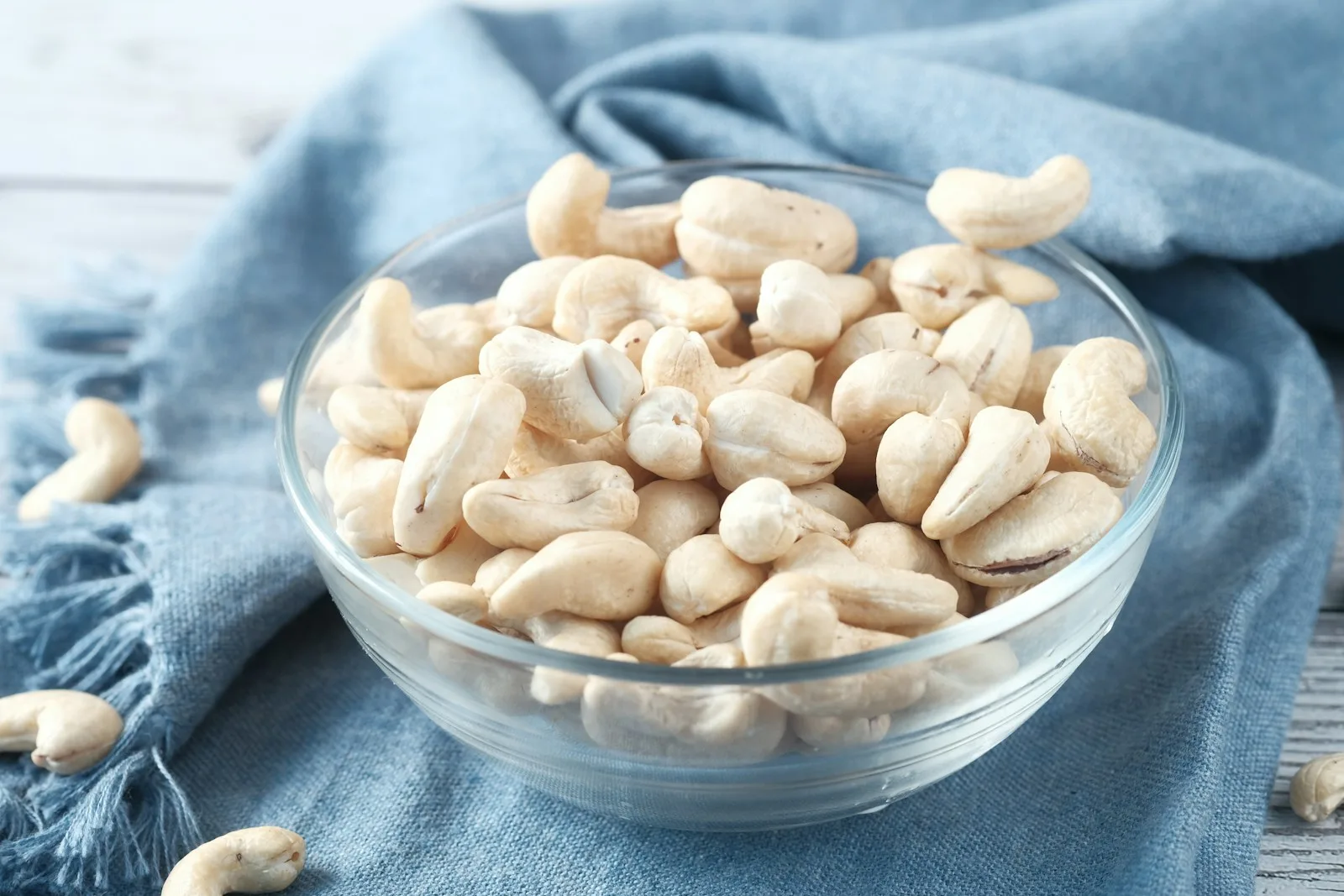Are you among the many who can’t get enough cashews? It’s easy to understand why. Cashews are not only a nutrient-dense and enjoyable snack, but they are also a great source of potassium, magnesium, phosphorus, manganese, selenium, and vitamin K. Is eating them every day justified by this, though?
Much like most things, there can be negative effects from too much good. Eating cashews on a daily basis has advantages and disadvantages. It’s crucial to consume them in moderation to avoid negating their health benefits.
We’ll share some cashew-related secrets with you in this post along with tips for making the most of these nuts. For instance, these so-called “nuts” are actually not nuts at all. Strictly speaking, a nut is a hard-shelled, dry fruit that has seeds inside. Conversely, cashews are truly seeds. Curious? Continue reading to learn more about that, as well as the consequences of consuming cashews on a daily basis.
Table of Contents
If You Eat Cashews Every Day

You invest a significant amount of money
Recall that we previously stated cashews aren’t truly nuts? This is among the factors that contribute to its relatively high cost as a snack. In technical terms, cashews are the seeds of a “drupe,” which is a fruit with a fleshy outer layer and a hard shell that contains a seed (peaches are also considered drupes to help visualize this). However, the difficulties don’t end there.
Cashew apples include cashews that need to be removed in order to be consumed. However, this is a risky task because the cashew’s seed, or shell, contains poisonous oil.
Cashew apples include cashews that need to be removed in order to be consumed. However, this is a risky task because the cashew’s seed, or shell, contains poisonous oil. In actuality, the same oil that irritates the skin is found in poison ivy, poison oak, and sumac (which, strangely enough, is also the reason why eating mangoes can cause your mouth to burn). For this reason, cashews are never found in shells, unlike other nuts or what are known as nuts but are actually seeds, such pistachios and almonds.
Heat is necessary to remove the cashew’s shell.
After the shell is removed, the cashew itself is retrieved, packed, and sold for a price commensurate with the amount of effort and risk involved in its preparation.
It’s Possible to Reduce Cholesterol
Cashews are the third most popular tree nut consumed in the United States, regardless of whether they are actually nuts according to botany. This, however, upsets certain groups, as cashews are seen to contain too much saturated fat to be a useful component of a diet that is balanced (more on that later on). However, this is not quite accurate, per a study that was published in the American Journal of Clinical Nutrition.
This study discovered that eating cashews as a snack instead of potato chips reduced total cholesterol levels by 5%, with LDL or “harmful” cholesterol falling most significantly.
This demonstrates the potential benefits of consuming a reasonable amount of cashews every day—one ounce, or about eighteen—as recommended by experts. Therefore, it would be wiser to opt for the cashews rather than anything high in carbohydrates the next time you have a need for something crunchy.
You Consume More Saturated Fat.
This is possibly the main factor contributing to cashews’ poor health reputation. Because cashews contain twenty percent saturated fat, they cannot qualify for the FDA’s health claim that nuts help improve heart health. But this tale is more complex than it first appears.
It is accurate to say that cashews have a high content of saturated fat. That cannot be disputed. Furthermore, there is no doubting that excessive amounts of saturated fat are thought to be detrimental to one’s health. Saturated fat, however, is not created equal. A 2017 study published in the American Journal of Clinical Nutrition found that stearic acid makes up about one-third of the saturated fat in cashews. Less of a black-and-white decision should be made because this fatty acid has very little bearing on cholesterol. Cashews are equivalent to other nuts in terms of heart health, even if they may technically have higher fat content than other nuts due to the presence of stearic acid.
You Could Lower Your Risk Of A Stroke Or Heart Attack
Nutrient-dense cashews are excellent for your body. For starters, their high magnesium content can lower your risk of ischemic heart disease, which is a condition when the heart’s blood flow is insufficient. Additionally, magnesium keeps your heart pumping consistently, and too little of it might result in palpitations. Not only that, but the same magnesium has the potential to lower the risk of hemorrhagic strokes.
Regular nut consumption, such as eating cashews, has been linked to a 30-50% lower risk of heart attack, cardiovascular illness, and sudden cardiac death. In particular, a 32-year research published in the Journal of the American College of Cardiology revealed that eating one ounce of nuts five days a week or more reduced the risk of cardiovascular disease and coronary heart disease by 20 percent and 14 percent, respectively. Thus, it would appear reasonable to conclude that eating cashews on a daily basis would not be harmful!
You’ll Consume a High Calorie Diet
A serving of cashews is about eighteen nuts. If that seems like a strange quantity, consider that to be about 1 ounce or 28 grams. Although that may not seem like much, the number is there for a reason: calories.
Although cashews offer numerous health benefits, their high calorie level is a major drawback. There are 157 calories in that single 18-cashew serving. Age, weight, and gender all affect the required daily calorie consumption, but in general, a man needs about 2500 calories per day, while a woman needs about 2000.
You can understand why this could be a problem as this figure drops by 500 for those who are attempting to lose weight. Eating more than 157 calories in a single snack period—not even a meal—can make it more difficult to stay under your daily calorie goal.
There will be a ton of protein

A diet’s essential component is protein. It is used by your body to produce and preserve blood, tissues, muscles, hair, antibodies, and other essential components. The Recommended Dietary Allowance (RDA) for protein is around 0.36 grams per pound of body weight, according to Harvard Health Publishing.
It’s the absolute lowest amount of protein you can consume daily without feeling ill, and it increases based on your activity level, whether or not you are pregnant, and other reasons.
A healthy approach to obtain at least some of that daily protein is by eating cashews and other nuts. You get 5.16 g of protein in one serving of cashews. This is wonderful news because cashews are one source of protein that does not originate from animals, but many protein-rich foods like beef, pig, chicken, eggs, or milk are off-limits to vegetarians and vegans.
It Won’t Aid in Diabetes Management
It makes sense that medical practitioners would want to determine whether cashews are healthy enough to assist control long-term illnesses like diabetes, since they can be beneficial when eaten in moderation. Numerous researches have been conducted on this topic, but regrettably, the outcomes weren’t as encouraging as one may have hoped.
According to a 2021 study that was published in Diabetes & Metabolic Syndrome: Clinical Research and Reviews, eating cashews had no effect whatsoever on glycemic indices, indicating that they are ineffective at lowering or maintaining blood sugar levels. It was also ineffective in reducing waist circumference, body weight, or Body Mass Index (BMI), indicating that it is likewise ineffective in reducing Type 2 diabetes from that perspective.
These findings were validated by a related study that was published in the International Journal of Endocrinology and Metabolism and only included Type 2 diabetes patients. For eight weeks leading up to the study’s conclusion, participants received a daily portion of cashews. Weight, waist circumference, BMI, serum insulin, and the ratio of low-density lipoprotein cholesterol to high-density lipoprotein cholesterol were measured after the eight weeks had passed. The weight-related variables remained unchanged, while the amount of insulin and “bad” LDL cholesterol decreased. Although this could be important, further research is required before a definitive conclusion can be made.
They Could Aid in Regulating Appetite
Even if eating cashews won’t make you lose weight, they can nevertheless help you manage your weight. Cashews are a lot more filling snack than junk food or potato chips because, like other nuts or nut-like foods, they are loaded with protein, fiber, and good fats. They prolong the feeling of fullness, so you can avoid the need to snack excessively between meals and go from breakfast to lunch or from lunch to dinner.
Because they taste nice and are crunchy, many people might find them to be a satisfying substitute for other, less healthy snack items.
When you take a serving of cashews, you genuinely feel like you have eaten something substantial and enjoyable, unlike certain other diet foods that are eaten in small portions and may not even be something you like. This makes them perfect for dieters since they satisfy cravings and keep you full without requiring you to eat anything you consider to be a “diet food.”

They Could Make You Consume More Sodium
Part of the reason cashews make an excellent alternative to fatty, highly processed snack meals like chips is that they too have the texture and flavor of junk food. But regrettably, there are instances when they actually are.
Always go for unsalted or low-sodium cashews when attempting to include them in a healthy diet or weight loss program. About 300 mg of sodium, or 15% of the daily required intake, can be found in 100 grams of salted cashews.
Adults should take less than 2000 mg of salt daily, or less than 5 g or 1 tsp., according to WHO recommendations. Since sodium is present in many other foods that we eat on a daily basis, it’s critical to check labels to determine how much you’re consuming. Fortunately, there are a number of cashew alternatives that are low in salt or contain none at all, so this is one area where you can manage how much sodium you eat.
read also : Soaked Peanuts in your diet and their amazing health benefits 2024
Here’s What Happens When You Eat Cashews Every Day (msn.com)


1 thought on “What Occurs If You Eat Cashews Every Day”